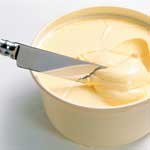The 4 Fats
Although just about everyone in the world has the impression that all fat is horrible and that we must not eat fat. Well, that is just not true. With all of the fat-free, non-fat, low-fat products in the world, can u believe that our body actually NEEDS fat to survive? Here are some of the good things that fat does for our body:
- Fat provides a ready source of energy.
- It is proven to improve children’s growth.
- It supports the cell walls within the body.
- Fat enables the body to circulate, store, and absorb the fat-soluble vitamins A, D, E, and K.
- It supplies essential fatty acids that the body can’t make and must therefore get from other foods.
- Helps promote healthy skin and hair.
- Of course it makes food taste better.
- It surrounds the vital organs for protection and support.
- It provides a layer of insulation just beneath the skin. This is why people who are extremely thin are always cold, and overweight people tend to be uncomfortable warm in hot weather.
Although all of these are great reasons for why our body needs fat, there are good fats and bad fats. There are four types of fats, monounsaturated (good), polyunsaturated (good), saturated (bad), and trans-fatty acids (bad).
Monounsaturated Fats

|
Have you or someone around you ever gasp at the thought of eating an avocado? “They’re so high in fat!” That is what many people say, and yes avocados are high in fat, and not too long ago, avocados were on the ‘do not eat’ list. However, times have changed, science has changed. Avocadoes may be high in fat, but it is the good fat…Monounsaturated fat. These fats are proven to lower blood cholesterol. So now you know the truth about avocadoes. It is my number one pet peeve when someone picks on me for eating my avocado sandwich. So, if someone tries to do it to you, explain to them about monounsaturated fats and that your body needs these fats. Not only do avocadoes carry monounsaturated fat, but also olive oils, peanut oils, sesame seed oils, and canola oils.
Polyunsaturated fats

|
Saturated fats are the demons of all fats because they can raise your blood cholesterol, which then can lead to heart disease. Animal fats found in meat, poultry, and whole milk dairy products are all high in saturated fats. Also saturated fat will be found in coconut, palm, and palm kernel oils; which are found in cookies, crackers, nondairy creamers, and other baked products. Saturated fats help to stimulate the production of LDL cholesterol (bad cholesterol), which in turn increases blood cholesterol levels, and the risk of heart-disease. Do yourself a favor and try to cut back on the consumption of saturated fats. Doing this will help your from heart disease, certain cancers, and other potential health problems in the future.
Saturated Fats

|
Saturated fats are the demons of all fats because they can raise your blood cholesterol, which then can lead to heart disease. Animal fats found in meat, poultry, and whole milk dairy products are all high in saturated fats. Also saturated fat will be found in coconut, palm, and palm kernel oils; which are found in cookies, crackers, nondairy creamers, and other baked products. Saturated fats help to stimulate the production of LDL cholesterol (bad cholesterol), which in turn increases blood cholesterol levels, and the risk of heart-disease. Do yourself a favor and try to cut back on the consumption of saturated fats. Doing this will help your from heart disease, certain cancers, and other potential health problems in the future.
Trans-fatty Acids

|
This type of fat is not naturally occurring, but is actually created when innocent unsaturated fats undergo a manufacturing process called hydrogenation. This is when a liquid of semi-soft fat is transformed into a more solid state. Trans-fatty acids act as saturated fats inside the body and raise blood cholesterol, this makes them very harmful. So you ask “why mess with a good fat?” Well, because the process can help preserve food or even enable a food company to change the texture of a product. A beautiful example is margarine. Margarine in the liquid form is unsaturated, but with some hydrogenation, it becomes semi-sift (tub margarine). Then with a little more hydrogenation it becomes even harder…known as stick margarine. Because most people would rather have the tub or stick margarine, they don’t know it, but they are filling themselves up with trans-fatty acids. What is even worse about this is trans-fatty acids do not appear on a nutrition label. So most people won’t even know whether or not what they are eating has trans-fat in it!